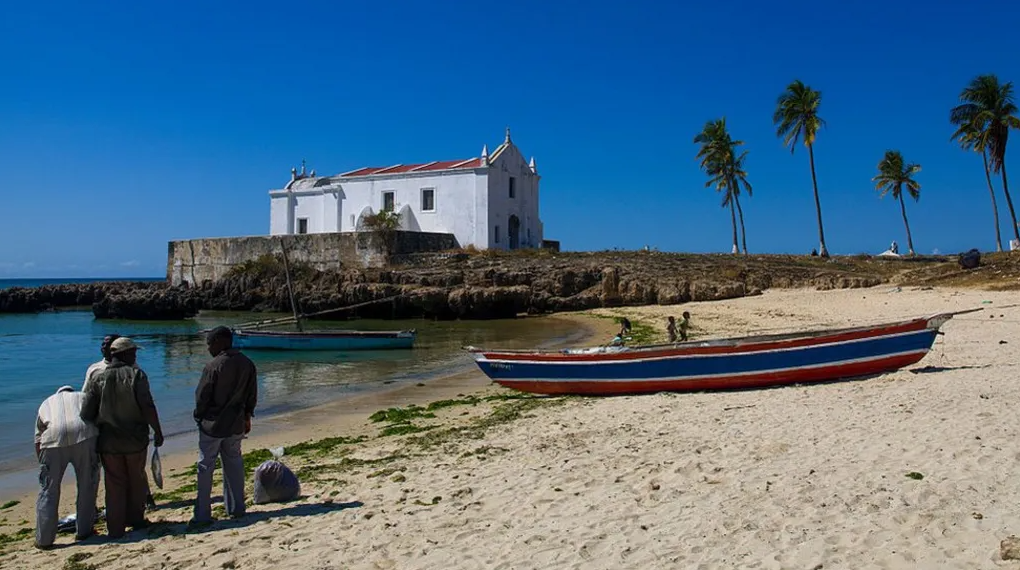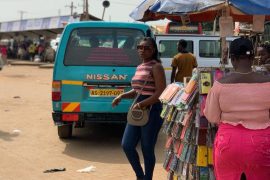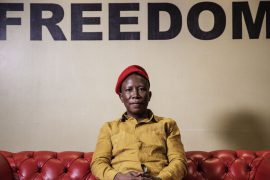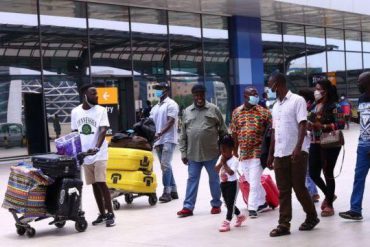“I no know how I bin manage to escape – I no fit swim,” Muaziza Ambaraje tok.
She bin dey inside di ferry as Mozambique worst sea disaster in recent memory happun on Sunday 7 April.
Di 47-year-old na regular on di makeshift ferry between Lungá, wia dem born am, and Mozambique Island wia she dey live.
“No wave take us by surprise, we no hit any rock, and di wood no loose,” she tok.
“Water get into di boat sake of say e dey overcrowded – lots of pipo bin panic and start to jump into di sea.”
Next, Ms Ambaraje describe a nightmare jumble of bodis of pipo wey dey alive and pipo wey don die, as she struggle to keep afloat. More dan 100 pipo die for di chaos, including 17 members of her family.
Her mother, father, grandmother, niece and nephews all die, Mrs Ambaraje tok. She no fit tink of any reason wey make her survive apart from God’s mercy.
Dem bin dey on dia way to visit Mozambique Island popular weekly market ahead of Eid, Ms Ambaraje tok. E suppose be time of celebration for dis Muslim-majority part of di kontri.
“I feel completely broken inside,” Momade Issufo tok. Im bin rush ova to rescue pipo on Monday as soon as e hear di news of di shipwreck.
“I see bodis wey dey piled up on di shore – some na children as young as three years old. Pipo bin dey panic.
“I bin get no choice – as a human being I gatz help. Pipo bin still dey for di rescue boats, so we bin transport dia bodis in my truck to dia relatives homes.”
Di 44-year-old tok say im heavily pregnant cousin bin dey among di dead. Di ordeal don make am depressed and unable to work.

Mr Issufo want make di Mozambique goment build a new bridge from di mainland to di island, a Unesco World Heritage Site, so pipo no go rely on di dangerous boats.
Thousands of fishing boats dey operate illegally as ferries along di kontri 2,750km (1,708-mile) coastline, by di goment own admission.
Passengers tell di BBC say unregulated operators dey often overload di boats to increase dia profits.
So why Mozambique allow dis to happun? Wetin be di compensation wey victims of Sunday disaster go get? And how di authorities go stop such tragedy so e no go happun again?
Di goment initially decline to respond to di BBC request for comment. One official from di kontri maritime agency also tell di BBC say dem bin dey under instructions not to comment.
However, one local official for di province of Nampula, Secretary of State Jaime Neto, later tell di BBC say transport, food and psychological support dey on offer, and coffins for di dead bin dey supplied.
No tok of compensation or financial aid yet.
Three days of national mourning dey come to an end on Friday, and dem don launch one inquiry to find di cause of di accident and make recommendations.
Di goment initial explanation for Sunday tragedy be say panicked pipo bin dey run comot for di mainland in large numbers, afta false information dey spread around, wey tell pipo say dem gatz go to Mozambique Island to escape one ongoing cholera outbreak.
While visiting pipo wey dey mourn on Wednesday, President Filipe Nyusi condemn di “bad faith” spreaders of disinformation wey “sow fear and terror among di population”.
Boat accident dey common for Mozambique but e dey rare for many pipo to die
Di total number of dead still dey disputed.
One local official wey speak to di BBC tok say 115 pipo don die, significantly higher dan di 98 reported by central goment.
Ibrahim Momade Munheti, Jembesse community leader, also tok say 150 pipo bin dey on di boat wen e sink. But di goment tok say di boat bin dey carry closer to 130 pipo.
Di Muslim faith require swift burial, and many of di boat disaster victim don already dey buried for Mozambique Island – some of dem two to one grave.
Dose wey dem leave behind now get pain of losing dia dearest, e dey mixed wit gratitude for dia own survival.
“My time neva arrive yet – na Allah order,” Muaziza Ambaraje.
Additional reporting na by Natasha Booty and César Gatoma






